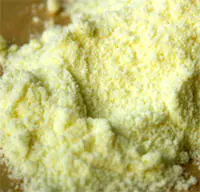Since distant Soviet times, bodybuilders have been looking for ways to consume proteins and protein unlimitedly. In this regard, they consumed everything they could get: powdered eggs, baby food and whole milk powder. Often this was due to limited availability in our stores. specialized food products and shortage protein mixtures. Not enough attention has been paid to natural protein products that provide good mass gain during weight training.
Of all this diversity of preferences, opinions and habits, only disagreements regarding food consumption have survived to this day. milk powder as real protein source. Let's look at the real picture of using milk powder and its effectiveness and usefulness for exercise and increasing muscle mass.
Naturally, our article discusses normal legalized milk powder, and not another fake from a “fake” factory in the Moscow region. So, powdered milk is nothing more than the same milk, but deprived of moisture and water as a result of technological evaporation. The remaining components should be identical in both dry and regular cow's milk. However, the ratio of micronutrients and macronutrients is certainly disrupted during this process, i.e. When dehydrated, their percentage changes.
100 grams of whole milk powder contains:
- 25-27 grams of protein
- 25-27 grams animal fat
- 35-37 grams carbohydrates
- 35 grams of monosaccharides and disaccharides.
It can be noted that whole milk powder is a fairly fatty product nutrition, without looking at the high percentage of milk protein content in it. You need to know that milk powder contains fats of animal origin, they are classified as saturated. Therefore, unlimited consumption of powdered milk is fraught with consequences, because the consumption of such fats requires adequate limits within the needs of the body, and nothing more. Do not allow an increase in the consumption of saturated fats as a result of improper intake of milk powder, as this will lead to an imbalance in the nutritional balance in the body, which in turn can cause a failure of metabolic processes and the formation of fat deposits. So don't abuse With this product, as always, maintain balance and measure in the amount of milk powder.
|
Powdered milk in bodybuilding. List of useful microelements. |
|
| calcium | Calcium in our body is responsible for the formation of the human skeleton, affects the course of blood clotting and water exchange in the body. This mineral is essential for muscle contractions, it regulates the secretion of hormones and has anti-inflammatory properties. |
| potassium | Potassium in the human body is responsible for normalizing the rhythmic functioning of the heart and coordinating the water balance in the human body. |
| sodium | Without sodium in the human body, the normal balance of fluids in the human body is impossible. In the form of various salts, sodium is present in the blood and digestive juices. |
| magnesium | Magnesium in the human body is indispensable in regulating the balance between muscle and nervous tissues, and it is also involved in protein synthesis. |
| iron | Iron in the human body is a builder of hemoglobin. Iron affects the immune system and plays an important role in the process of energy production in muscle tissue and cholesterol metabolism. |
| phosphorus | Phosphorus in the human body is necessary for the normal functioning of the heart muscle, nervous system and other... |
| zinc | Zinc in the human body is responsible for the functioning of some sex hormones, the pituitary gland, as well as the adrenal glands and pancreas. Increases immunity and promotes the formation of hemoglobin and red blood cells. |
From the above table it is clear that it (milk powder) can serve as an excellentsource all these microelements during heavy training of bodybuilders. In addition, powdered milk also contains vitamins, such as A, E, B1, B2, B9, PP. This is certainly a positive argument in favor of this product, especially considering its long shelf life and extreme portability.
It is necessary to mention the protein of powdered milk. Along with plain milk, the dry product contains about 20% whey protein and about 80% casein protein. This content leads to indigestion of food by the stomach at times when rapid saturation with amino acids is needed, for example, in the morning or after training. And consuming powdered milk in the evening before bed as a source of casein protein and creatine is harmful due to its high percentage of fat. A possible option for consuming powdered milk is just to look for it with low fat content 5-15%, and in no case confuse it with dry cream with a fat content of 50 percent or even more!
Post Views: 123


